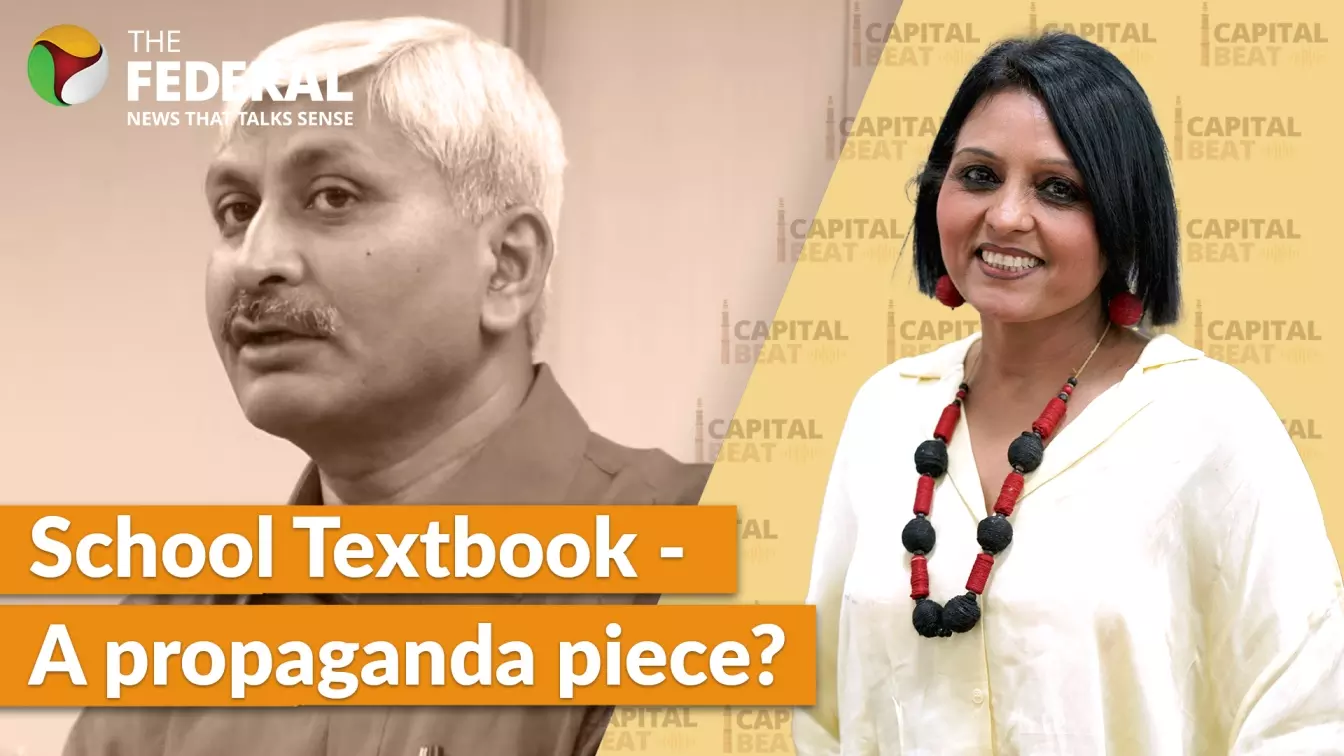
NCERT textbook draws flak
Capital Beat: 'States like TN, Kerala, Bengal should fight saffronisation of NCERT books'
NCERT’s Class 7 English book draws flak for promoting govt schemes — are kids being used for propaganda? The Federal in conversation with Prof Apoorvanand

In the latest episode of Capital Beat, Professor Apoorvanand of Delhi University joined The Federal to unpack growing concerns about the politicisation of school education in India. At the centre of the debate is a class 7 English language textbook titled Poorvi, which academics say promotes central government schemes such as Digital India and Beti Bachao Beti Padhao as part of curriculum activities.
From urging students to learn about gaushalas to attributing school facilities for visually impaired students to Digital India, the textbook contains activities that critics say transform education into a mouthpiece for ruling party narratives.
Curriculum or campaign trail?
The problem, according to Professor Apoorvanand, is not limited to praise for government schemes. It’s about the intent and precedent. “It’s unprecedented and obnoxious for any government to use textbooks for its own propaganda,” he said, asserting that even previous NDA or UPA regimes had not crossed this line.
He warned that textbooks are being misused to turn children and teachers into agents of state-led messaging. “Textbooks should trigger curiosity and questioning, not obedience,” he noted.
Sole knowledge source
In a country where textbooks often become the only learning resource for millions of students, the implications are far-reaching. “Teachers treat them as gospel truth,” Apoorvanand said, which means any suggestion — like visiting a gaushala — will be executed without question, leaving no room for alternative viewpoints or critical thinking.
From urging students to learn about gaushalas to attributing school facilities for visually impaired students to Digital India, the Class 7 textbook contains activities that critics say transform education into a mouthpiece for BJP narratives.
He explained that post-2005 education reforms under the National Curriculum Framework had aimed to equip children with tools to analyse, critique, and learn from diverse perspectives. But those reforms, he said, are now being reversed. “The clock has been turned back.”
Whose idea of patriotism?
According to him, among the most striking issues is the textbook’s definition of patriotism —framing it through symbols like the National War Memorial and the Vande Bharat train. “Why only war memorials? A farmer or a labourer is just as much a patriot,” Apoorvanand argued, adding that struggles to save forests or rivers also demonstrate love for the country.
He questioned why such examples are excluded, suggesting a deliberate shaping of nationalist narratives aligned with a particular political ideology.
Beyond ideological concerns, the shift has deep implications for pedagogy. Education, Apoorvanand said, is meant to build imagination, creativity, and independent thinking. When textbooks are reduced to toolkits of government schemes and slogans, these learning objectives suffer.
Drawing parallels with Stalinist Russia and Maoist China, he warned that a nation of “obedient citizens” unable to think for themselves is being engineered through these educational choices.
A federal issue
The centralisation of curriculum via NCERT and CBSE textbooks, he noted, also weakens federal autonomy. “States like Tamil Nadu, Kerala, and West Bengal must take the lead in developing their own textbooks,” he said, pointing out that it is not mandatory to adopt NCERT books. However, entrance exams like NEET and CUET follow the CBSE curriculum, indirectly coercing states and schools into compliance.
Asked if change is still possible, Apoorvanand said reforms are unlikely under the current regime. But non-BJP-ruled states can and should exercise their rights. He urged them to craft better textbooks—ones rooted in democratic pedagogy rather than political branding.
He also appealed to parents and media to raise awareness. “Tell your children: they deserve better. Don’t let them become carriers of government propaganda.”
The content above has been generated using a fine-tuned AI model. To ensure accuracy, quality, and editorial integrity, we employ a Human-In-The-Loop (HITL) process. While AI assists in creating the initial draft, our experienced editorial team carefully reviews, edits, and refines the content before publication. At The Federal, we combine the efficiency of AI with the expertise of human editors to deliver reliable and insightful journalism.

